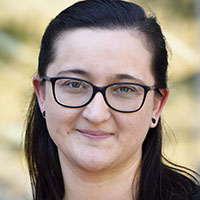

Email: marinka@cs.stanford.edu
Position: Postdoctoral Fellow
Current Institution: Stanford University
Abstract: Next-Generation Algorithms for Complex and Heterogeneous Biomedical Networks
Complex systems are ubiquitous in biology and medicine, where they encode connectivity patterns at all scales. For the first time, technology has enabled large-scale, objective measurements of these systems, such as the genetic fingerprinting of each of 37 trillion cells in the human body. Massive datasets from such technologies can accelerate discovery and create a new era of precision medicine with highly targeted drugs and treatments. We study large complex interconnected systems at all scales, from interactions of proteins in a cell to interactions between patients in a society.
Mathematical machinery that is central to these complex systems is machine learning on graphs. We define novel graph convolutional deep networks that learn data transformation functions, which we use to map nodes to embeddings, points in low-dimensional vector spaces. These deep models can embed nodes, subgraphs, and highly multi-relational graphs. We show that these methods enable practical biomedical applications of high impact, such as predicting which diseases a drug would treat, identifying which side effects patients will get from a specific drug combination, and predicting which roles a protein has in a particular human tissue.
We also present a mathematical understanding of graphs in the context of biology and medicine, where such algorithms can uncover new biology and be used to accelerate knowledge discovery. We have developed methods that generate actionable insights in the form of hypotheses derived from biomedical data. We show that these network science algorithms can be used to enhance networks and automatically identify hypotheses with the highest prospect, ranging from drug repurposing in medical drug networks to cell-type discovery in cell interaction networks.
Bio:
Marinka Zitnik is a postdoctoral fellow in computer science at Stanford University, working with Professor Jure Leskovec. Her research interests are in computational biology, machine learning, and network science. She is particularly interested in the areas of representation learning, graph embeddings, and application areas of biology and medicine.
She received a PhD in computer science from University of Ljubljana in 2015 while also conducting research at Imperial College London, University of Toronto, Baylor College of Medicine, and Stanford University. She received a bachelor’s degree in computer science and mathematics in 2012. Her work received several best paper, poster, and research awards at major computational biology conferences, including ISMB, CAMDA, RECOMB, and BC2. She received a Google Anita Borg scholarship, was selected as a Young Fellow at Heidelberg Laureate Forum, and received the Jozef Stefan Golden Emblem Prize. She is also a member of the Chan Zuckerberg Biohub at Stanford.

